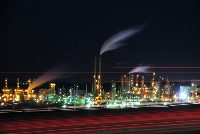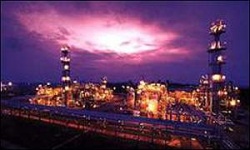US refiners may profit from Petroplus closures in Europe
By BEN LEFEBVRE
US refiners could see new opportunities as Europe's largest independent refiner and wholesaler of petroleum products shuts down three of its five refineries, analysts said.
Petroplus Holdings announced the three closings last Friday as banks starting freezing more than $2 billion worth of the financially troubled Swiss company's credit lines.
Petroplus has faced stubbornly high crude prices, stagnant demand and fierce competition from overseas refiners, which has led to net losses in every quarter except one since 2009.  The refinery shutdowns in France, Belgium and Switzerland could help US crude processors fill refining gaps and grab market share in Europe. That could increase the expanding US exports of oil distillates, such as heating oil and diesel, to the Continent.
The refinery shutdowns in France, Belgium and Switzerland could help US crude processors fill refining gaps and grab market share in Europe. That could increase the expanding US exports of oil distillates, such as heating oil and diesel, to the Continent.
Output from the combined 667,000 barrels a day of refining capacity at the shuttered refineries already has ceased, while the company's refineries in UK and Germany are running at half of their combined 330,000 bpd capacity, according to Petroplus CEO Jean-Paul Vettier.
Half of Petroplus's output is diesel, according to a Bank of America energy newsletter.
Europe has felt the effects of the closures. January diesel contracts on London's Intercontinental Exchange settled at $967.50 a metric ton Thursday, up 4.7% for the week, in part because of supply worries in the wake of Petroplus's shutdowns.
US fuel prices have yet to see any impact from the falloff in Petroplus's production.
That could start to change if the closures linger through the winter and allow US refiners to stake stronger claims in the European market, said Jason Schenker, president of consultancy Prestige Economics.
"The longer Petroplus stays offline, the greater the probability for it to have a lasting impact" on US refiners, Schenker said.
With Petroplus's production diminished, Europe's demand for U.S. diesel will only increase. That will likely result in higher prices as more customers compete for U.S. fuel supply, said Sander Cohen, analyst at energy consultancy ESAI Inc.
The Petroplus closures "will definitely put pressure on US diesel markets," Cohen said.  American refiners already have been feeding Europe's growing appetite for heating oil and diesel.
American refiners already have been feeding Europe's growing appetite for heating oil and diesel.
The US exported a record 1.07 million barrels a day of distillates last October, the last month for which statistics are available, according to the US Energy Information Agency. That's up 22% from a year before.
Europe was the destination of 48.4% of all US distillate exports in October, an increase from 43.5% a year prior, according to the EIA.
The enhanced opportunity for US refiners comes at a good time for companies like Valero and Marathon Petroleum.
They could use extra diesel sales to Europe to offset an expected drop-off from what had been near-record level profit margins in 2011.
For most of last year, refiners with operations in the Midwest benefited from easy access to cheap oil caused by a glut of crude at the oil storage hub in Cushing, Okla.
As that price advantage has shrunk, so have those refiners' profit margins.
How long European refining woes could last is still being debated, analysts said. Europe has spare refining capacity that could be brought online to make up for Petroplus's former output.
However, the region struggles with old, inefficient equipment and is dependent on European grades of crude like Brent oil, which has been more expensive than the crude used by most US refiners for about a year.
In contrast, Valero, Marathon Petroleum and other US refiners have invested billions of dollars in equipment upgrades over the past few years to become more efficient.
Dow Jones Newswires






Comments